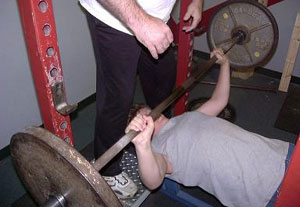Many students show up in required core curriculum courses uncertain why they are being made to take it, and as a result resentful. One of the ways I try to explain the necessity of Liberal Arts elements of education even for those pursuing professional degrees is as follows.
 If you bench press/lift weights, the reason for doing so is, I suspect, not to prepare yourself just in case you happen to find yourself in a real life situation in which you are underneath a very heavy and have to raise it by about a foot. If you run, it is probably not primarily to prepare for a situation in which you are being chased. We exercise in order to keep in shape and build strength to benefit us in activities other than the specific ones we do for exercise.
If you bench press/lift weights, the reason for doing so is, I suspect, not to prepare yourself just in case you happen to find yourself in a real life situation in which you are underneath a very heavy and have to raise it by about a foot. If you run, it is probably not primarily to prepare for a situation in which you are being chased. We exercise in order to keep in shape and build strength to benefit us in activities other than the specific ones we do for exercise.
The same is true with the mind. The benefit of doing puzzles is not in case you find yourself in a job later in life in which you are a proofreader and all the letters of all the words in an article assigned to you become scrambled, or in case you end up employed as a museum curator and have to piece back together a painting that some malicious person has cut into pieces. They are exercise for the brain. They help us build attention to detail, lateral thinking, and other skills.
The same can be said of the liberal arts in general. Reading challenging texts and thinking critically about big questions is like lifting a heavy weight, which will train your mind so that it can more easily lift the relatively lighter weights of day-to-day questions and issues. It will teach you humility, as you discover that some of your assumptions are wrong and that many of the new things that you learn, while more likely to be correct, are not themselves absolutely certain. It will provide training in thinking creatively, and give you a wide pallette of colors to draw on as you paint your own life.
Our new president at Butler University, Jim Danko, majored in religious studies as an undergraduate, then went on to start a medical technology company before moving into the realm of academic administration. He is well poised to appreciate the value of the Liberal Arts to real life employment both theoretically and from personal experience. In his first “State of the University” address at Butler, he emphasized the importance of the liberal arts, stating that in all his experience employers never tell universities that they wish students graduating from there had one more course in finance or other comparable subjects. They express a desire for students to take more courses that cultivate their creativity and critical thinking. They express appreciation for liberal arts education, and for graduates who not only have had one but understand the value of one.
 And so even before students ask, I try to answer the question that many of them have: “Why are they/you making me take this course?” The answer is because it is what will make your education a university degree rather than a vocational diploma. It is what employers want. It is the sort of course that will train your mind with the skills you need to navigate the future. Because increasingly we are seeing that the ability to think creatively, to bring practicality and aesthetics together, the ability to understand people of other cultures, and the many other things one gains from liberal arts education are crucial to your success, particularly in a world in which later in life you may need to use methods, skills and technologies that didn’t even exist when you were in college. Training in the ability to think and adapt is more essential than learning skills -although that is not to say that the latter are unimportant.
And so even before students ask, I try to answer the question that many of them have: “Why are they/you making me take this course?” The answer is because it is what will make your education a university degree rather than a vocational diploma. It is what employers want. It is the sort of course that will train your mind with the skills you need to navigate the future. Because increasingly we are seeing that the ability to think creatively, to bring practicality and aesthetics together, the ability to understand people of other cultures, and the many other things one gains from liberal arts education are crucial to your success, particularly in a world in which later in life you may need to use methods, skills and technologies that didn’t even exist when you were in college. Training in the ability to think and adapt is more essential than learning skills -although that is not to say that the latter are unimportant.
That’s the value of an education with a strong liberal arts component. And for what it’s worth, it will also add depth and beauty to your life, if you let it.












